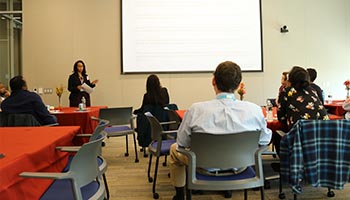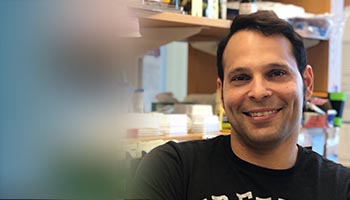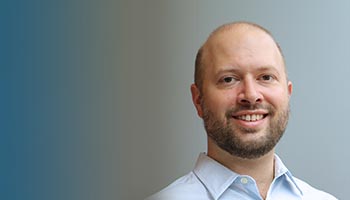HOW CAN WE HELP YOU? Call 1-800-TRY-CHOP
In This Section
Meet the Co-chairs of the CHOP Postdoctoral Alliance

The CHOP Postdoctoral Alliance is celebrating the completion of its first year.
Editor’s note: The CHOP Postdoctoral Alliance (CPA) is celebrating the completion of its first year. The goal of the CPA is to support the success of postdoctoral researchers (postdocs) here at CHOP. In this blog, we highlight the CPA co-chairs, Daniel Blumenthal, PhD, and Joseph Dybas, PhD. Cornerstone occasionally features the outstanding contributions of our postdocs and the initiatives they’re taking to improve science.
Daniel Blumenthal, PhD

Daniel Blumenthal, PhD, studies the ways in which dendritic cells modulate their cortical stiffness.
Meet Daniel Blumenthal, PhD, a postdoc in the Department of Pathology and Laboratory Medicine. Dr. Blumenthal is from Israel, and growing up, he wanted to be an astronaut.
Q: What would you like the CPA to accomplish during its second year?
A: I wish for the CPA to leverage our year one accomplishments and grow into a strong and solid postdoc organization. I wish (and I'm certain) that the CPA will continue to contribute to the career advancement and well-being of postdocs at CHOP. I wish that many postdocs will be involved in some part of the CPA in the coming year and that this will promote our advancement as a community.
Q: What research project are you currently working on?
A: In my work, I study the ways in which dendritic cells (DCs) modulate their cortical stiffness, and how they use this biophysical property to modulate the immune response. Through an interdisciplinary approach, I have shown that the cortical stiffness of DCs serves as a mechanical co-stimulatory signal that works in concert with conventional co-stimulatory signals to augment T-cell activation.
Q: What is your biggest accomplishment in life thus far?
A: Coming to the United States with a wife and two girls and starting a life here while pursuing a demanding academic career is not an easy feat, and I feel very proud of the way I approached it. Looking back at what I accomplished from the moment I came to CHOP, I feel that balancing between being an involved father, husband, and working to become an accomplished scientist, all while being away from my home and family support, is my biggest accomplishment.
Joseph Dybas, PhD

Joseph Dybas, PhD, uses proteomics approaches to quantify how viruses redirect ubiquitination during infection.
Meet Joseph Dybas, PhD, who is a postdoc in the Departments of Pathology and Laboratory Medicine, and Biomedical and Health Informatics. Dr. Dybas is from upstate New York, and he wanted to be a rock star as he grew up.
Q: What would you like the CPA to accomplish during its second year?
A: I think the CPA has an opportunity and responsibility to make tangible initiatives to advance issues of diversity, inclusion, and support within CHOP and the wider academic community.
Q: What research project are you currently working on?
A: My current work involves using proteomics approaches to quantify how viruses redirect ubiquitination during infection. My overarching goal is to identify cellular targets of viral-mediated ubiquitination, to determine the functional outcome of ubiquitination of these proteins, and ultimately to define the impacts on cellular and viral processes.
Q: What is your biggest accomplishment in life thus far?
A: I believe that being a good father and husband is my most important job. So, when I succeed at that I consider it to be my biggest accomplishment.